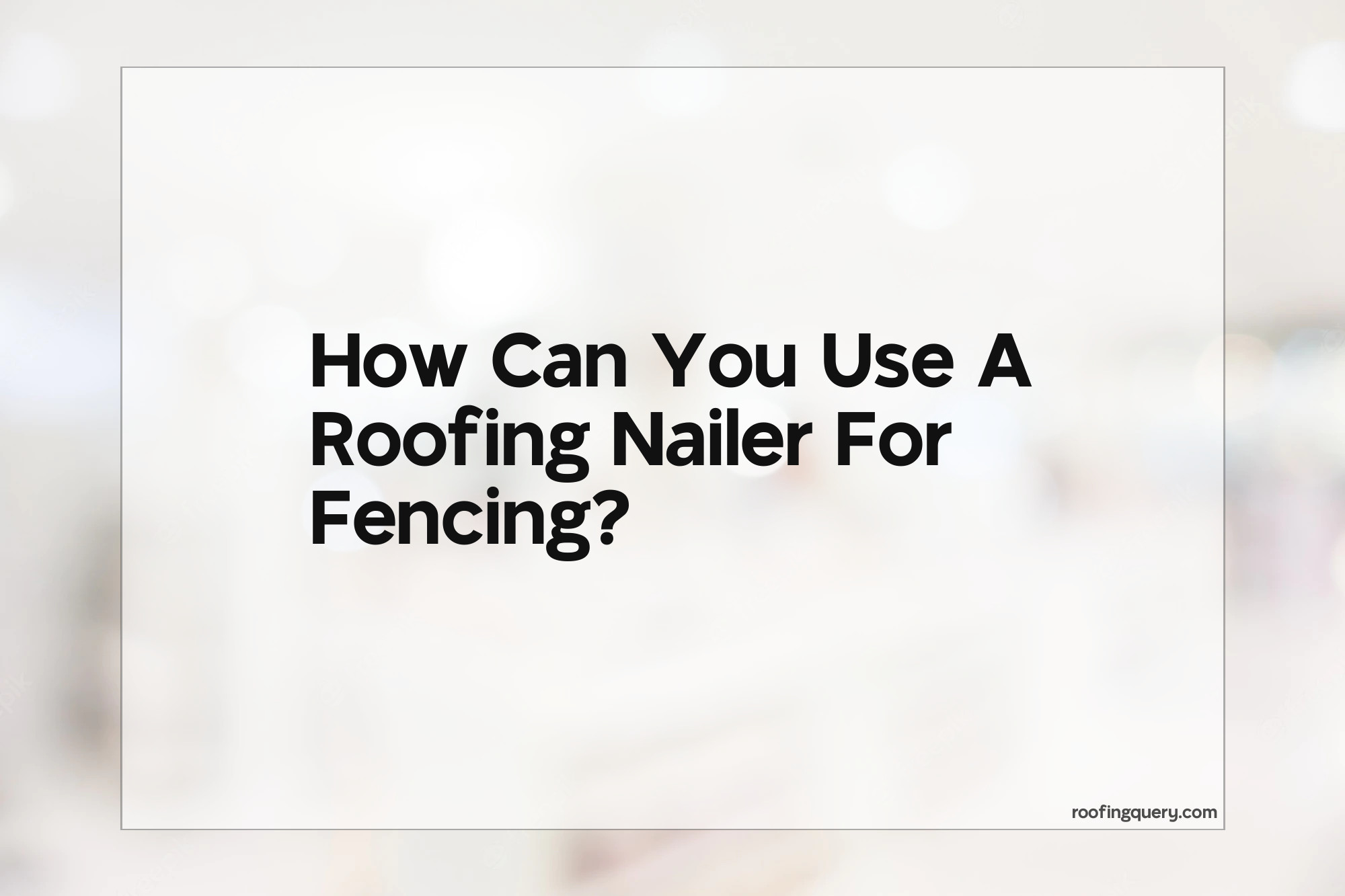Use a roofing nailer to attach fencing to your house.
You may not think of a roofing nailer as a tool for fencing, but it can be a handy tool to have on hand. Here are a few ways you can use a roofing nailer for fencing:
1. To attach fence boards to posts, simply nail the boards to the posts using the roofing nailer.
2. To attach wire fencing to posts, use the roofing nailer to nail the wire fencing to the posts.
3. To build a fence gate, use the roofing nailer to attach the fence boards to the posts.
4. To repair a fence, use the roofing nailer to replace any damaged boards or wires.
With a little creativity, you can find many uses for a roofing nailer when it comes to fencing. So, next time you need to do some fencing, consider using a roofing nailer to make the job easier.
What Are The Benefits Of Using A Roofing Nailer For Fencing?
Fencing with a roofing nailer is faster and easier than using a hammer.

When it comes to fencing, there are many benefits to using a roofing nailer. For starters, roofing nailers are designed to drive nails into tough materials like asphalt and concrete, making them ideal for fencing applications. Additionally, roofing nailers are equipped with a variety of safety features, like contact trip triggers and magazine disconnects, that make them safer to use than traditional nail guns. And finally, roofing nailers are built to withstand tough job site conditions, so you can rest assured that your fence will be built to last.
How Does A Roofing Nailer Help With Fence Installation?
It speeds up the process by automatically driving nails into the fence post.
One of the most important tools for any fencing project is a roofing nailer. This type of nail gun is specifically designed to shoot nails into hard-to-reach places, like the top of a fence. Roofing nailers are easy to use and can save you a lot of time and effort when installing a fence. Here’s a step-by-step guide to using a roofing nailer for your next fencing project:
1. Before you start, make sure your roofing nailer is properly loaded with nails. Consult your owner’s manual for specific instructions on how to do this.
2. Once your roofing nailer is loaded, position it so the nails are pointing down into the top of the fence.
3. Hold the roofing nailer with one hand and use the other hand to trigger the nails. Be sure to keep your fingers clear of the path of the nails.
4. Continue shooting nails into the top of the fence until it is fully secured.
5. That’s it! Your fence is now installed and ready to use.
A roofing nailer is a vital tool for any fencing project. With its help, you can easily and quickly install a fence without having to struggle with hand-nailing. Be sure to follow the steps above and consult your owner’s manual for specific instructions on how to use your roofing nailer.
What Are Some Tips For Using A Roofing Nailer For Fencing?
Use fence staples instead of nails.
If you’re planning on doing any roofing work, then a roofing nailer is an absolute must. Not only will it make the job a lot easier, but it will also help to ensure a much better finish. Here are some tips for using a roofing nailer for fencing:
1. Always wear safety goggles when using a roofing nailer. This will protect your eyes from flying debris.
2. Make sure that the area you’re working in is well ventilated. Roofing work can create a lot of dust, so it’s important to work in an area with good ventilation.
3. When loading the roofing nailer, make sure that the nails are facing the right direction. This will ensure that they are driven into the fence properly.
4. Always start at the bottom of the fence when nailing. This will ensure that the nails are driven into the fence at the correct angle.
5. When you’re finished, inspect the fence to make sure that all of the nails are driven in properly. If any are loose, simply drive them in with a hammer.
following these tips, you should be able to use a roofing nailer for fencing without any problems. Just remember to always work safely and to always inspect the fence when you’re finished.
How Do You Properly Load A Roofing Nailer For Fencing?
To load a roofing nailer, insert a coil of nails into the loading chamber and push down on the spring-loaded loading plate.
Are you planning on tackling a fencing project yourself?
If so, then you’re going to need to know how to properly load a roofing nailer. This guide will walk you through the steps of loading a roofing nailer for fencing, so you can get the job done right.
First, you’ll need to gather your supplies. You’ll need the roofing nailer, of course, as well as a supply of roofing nails. Make sure you have the right size nails for your roofing nailer – using the wrong size nails can damage the tool.
Next, you’ll want to load the roofing nails into the nailer. To do this, open the loading chamber and insert the nails, pointing the sharp end down. Once the chamber is full, close it up and you’re ready to start nailing.
When you’re ready to start nailing, position the roofing nailer against the fence post and pull the trigger. The nail will be driven into the post, and you can move on to the next one. Repeat this process until all of your fence posts are securely in place.
Now you know how to properly load a roofing nailer for fencing. With this knowledge, you can tackle your fencing project with confidence, knowing that your posts will be securely in place.
What Are Some Safety Tips To Follow When Using A Roofing Nailer For Fencing?
When using a roofing nailer for fencing, be sure to wear eye and ear protection and use gloves.
If you’re using a roofing nailer for fencing, here are some safety tips to follow:
1. Always wear safety goggles.
2. Be sure the area around you is clear of people and pets.
3. Keep your fingers away from the trigger.
4. Be careful not to damage the fence posts.
5. Don’t overdo it – only nail in the nails as far as they need to go.
6. If you’re not sure how to use the roofing nailer, ask someone for help.
7. Be extra careful on windy days.
Following these safety tips will help you avoid injury and keep your fence in good shape.
FAQ
How Do You Troubleshoot A Roofing Nailer When Fencing?
What Are Some Common Problems With Using A Roofing Nailer For Fencing?
How Do You Properly Maintain A Roofing Nailer For Fencing?
What Are Some Things To Consider When Purchasing A Roofing Nailer For Fencing?
– The type of roofing nailer (pneumatic, manual, or cordless)
– The size and weight of the unit
– The capacity of the nailer (how many nails it can hold at a time)
– The size and type of nails that it uses
– The warranty and customer support offered by the manufacturer
What Are Some Alternative Uses For A Roofing Nailer Besides Fencing?
If you still have any questions about using a roofing nailer for fencing, feel free to comment below.

